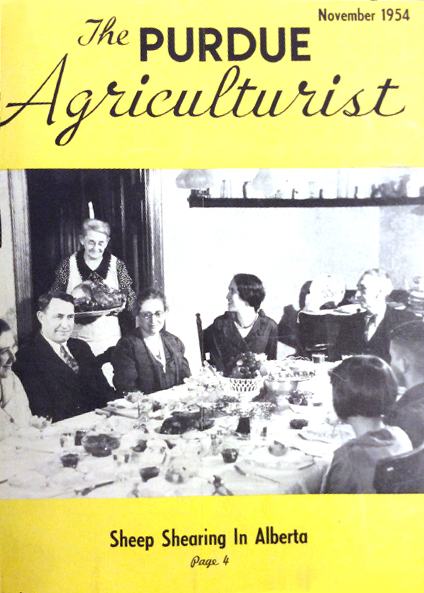History of IPIA and International Activities
Early History
Almost from the time of its establishment, Purdue's College of Agriculture displayed a global vision and an eagerness to engage with partners beyond America's borders. According to College of Agriculture historian Allan Goecker, Purdue's School of Agriculture had already engaged in international activities prior to the turn of the 20th century. Early issues of The Purdue Agriculturist, which was published from 1906-1969, contain numerous references to international activities led by faculty members, students, and alumni. As an early example, College archives document Prof. A. T. Wiancko's three-month study tour in 1910 during which he visited agricultural experiment stations in Denmark, England, Germany, Holland and Sweden to gain information and ideas that would be of practical use to Indiana farmers. An openness to learn from others, share knowledge with others, and respond to changing social conditions has been a cornerstone of Purdue's mission as a Land-grant university. Further evidence of the important role of international agriculture in Purdue's history is that the University's first honorary degree was awarded from the School of Agriculture in 1921 to Silverio Apostal, who at the time served as Secretary of Agriculture and Natural Resources of the Philippines.

Key to the further development of a strong foundation in international work were the efforts and leadership of Lowell S. Hardin (former Professor of Agricultural Economics), who joined the College in 1943. In 1965, following 22 years on the faculty, Lowell accepted an assignment as Senior Agricultural Officer in the International Division of the Ford Foundation. From there, he worked with those who created the concept of International Agricultural Research and Development and helped shape the Consultative Group on International Agricultural Research (CGIAR) to govern and sustain those efforts. During the ensuing decades, Lowell was one of the architects that created and nurtured many of the CG centers and was one of the early visionaries who promoted the cause of organized agricultural sciences to address the concerns of hunger and poverty. Along the way, he provided strong mentorship for many at Purdue. This created a climate and environment that allowed international work to flourish in the college in the ensuing decades. In 2019, IPIA established a college-wide faculty award for excellence in international activities in Prof. Hardin's honor.
Building on this early foundation, the first concerted steps toward making international agriculture a focused mission area in the College of Agriculture came in the 1950s. Brazil proved to be the catalyst. In 1951, Purdue staff began working with the Federal Universities of Brazil, including Viçosa, Pelotas, Rio Grande do Sul, and the Dairy Technology School at Juiz de Fora. This was a full decade before the United States Agency for International Development (USAID) would be established by President John F. Kennedy. The primary aim of college efforts at that time was to strengthen the agricultural departments of these young Brazilian universities.
